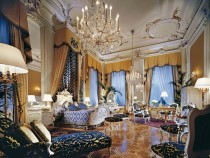
© Hotel Imperial
The age of the hunter and gatherer is past. Nevertheless, our genes still feel the excitement of mobility, which manifests itself in an urge to travel. As the writer Raoul Schrott describes, the word “hotel” can be traced back to a mythical source in ancient Greek: to the name of the goddess Hestia. Later in France, stately homes in towns and cities were referred to as “hôtels”. After the French Revolution, the term was used for important public buildings; and even today, the expression for a town hall is “hôtel de ville”. The history of accommodating and catering for travellers begins at an early date. People in old high cultures who were on friendly terms with each other would offer short-term accommodation within the palace walls for travelling ambassadors, noblemen and the like. Many early travellers were pilgrims who set out for holy places to consult an oracle. Wellknown travelling writers in antiquity, like Herodotus, Tacitus and Cicero, were of noble birth and certainly had access on their journeys to well-appointed accommodation with toilets, baths and tepidaria heated by warm-air ducts.
Most of the guest houses excavated in Pompeii possessed drainage and heating; but with the decline of Roman culture, hygienic standards sank to an archaic level again, a situation that lasted until well into the Middle Ages.
Most of the guest houses excavated in Pompeii possessed drainage and heating; but with the decline of Roman culture, hygienic standards sank to an archaic level again, a situation that lasted until well into the Middle Ages.



